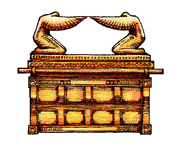Ethiopia and the Jews
This story is, of
course, devoid of any evidence from Scripture, and Sheba
is the other side of the Red Sea, the country now called
Yemen. We know from 2 Chronicles 35:3 that the ark was
still in Jerusalem in the time of King Josiah.
What is undoubtedly true
is that there are ancient links between Israel and
Ethiopia. The existence of black Jews in Ethiopia has been
known for some time. They are called Falashas, the name being
derived from the Amharic (the language of Ethiopia) word for
strangers, a reminder in itself of the way in which the
Jews have remained separate from the peoples among whom
they lived. The Falashas became prominent in 1984-5 when
12,000 of them were airlifted to Israel from refugee
camps in the Sudan, where they had fled because of
famine, in what was called Operation Moses. Operation
Moses came to an abrupt halt once it became public
knowledge, but in 1990 Israel and Ethiopia established
diplomatic relationships, and most of the rest of the Falashas
went to Israel. It is generally thought that the Falashas are
the descendants of converts made by Jews from Arabia in the
first and second centuries A.D.
In a visit to Ethiopia in
January 1990 Hancock came across another, less
well-known, Ethiopian tribe, known as the Qemant, which
appeared to have Jewish origins. He visited the Qemant and
found that they were mostly adherents of Ethiopian Christianity.
However, older members of the Qemant, generally regarded
as pagans, in fact preserved beliefs and practices going
back to the Law of Moses, particularly food laws and the keeping
of the sabbath, but mixed up with other practices
relating to their pagan religion.
Next section: Jewish Practices in the Ethiopian Church

